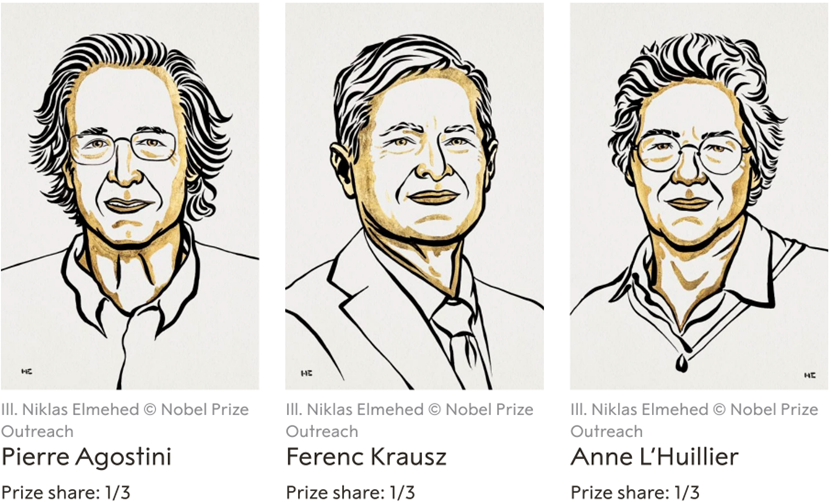The research and education programs offered by the Physics Department are in line with the Nobel Prize in Physics 2023

The Nobel Prize in Physics 2023 was awarded to Pierre Agostini, Ferenc Krausz and Anne L’Huillier "for experimental methods that generate attosecond pulses of light for the study of electron dynamics in matter". The experiments conducted by the laureates have yielded extremely short pulses of light, with durations measured in attoseconds. This remarkable achievement serves as evidence that such pulses can be utilized to capture intricate images of internal processes occurring within atoms and molecules.Anne L'Huillier's discovery in 1987 revealed the emergence of various light overtones when infrared laser light passed through a noble gas. These overtones, characterized by a specific number of cycles per cycle in the laser light, were a result of the interaction between the laser light and the gas atoms. This interaction provided additional energy to certain electrons, which was subsequently emitted as light. Anne L'Huillier's ongoing exploration of this phenomenon paved the way for future advancements. In 2001, Pierre Agostini successfully generated and studied a series of consecutive light pulses, with each pulse lasting a mere 250 attoseconds. Simultaneously, Ferenc Krausz conducted experiments that allowed the isolation of a single light pulse lasting 650 attoseconds.
The Department of Physics at HKBU is at the forefront of exploring the mysteries of the universe and harnessing the power of nature for the betterment of society. Our research interests and undergraduate and master programs align with some of the most groundbreaking discoveries in physics, such as the work recognized by the Nobel Prize in Physics 2023.
The research in the department of physics focuses on two niche areas. One is biophysics and nonlinear complex systems, such as cancer, brain study and human microbiome and statistical physics analysis and modeling of such complex systems. The other niche area is advanced materials, especially energy materials and devices, such as solar cells. The esteemed faculty members, Prof SO, Shu Kong and Prof ZHU, Fu Rong, are deeply involved in research related to organic electronic materials and devices, as well as optical spectroscopy of materials. Their work investigates the behavior of electrons in materials, which is crucial for understanding and controlling electronic devices. This is closely related to the Nobel laureates’ work on attosecond pulses, further emphasizing the relevance and importance of our research.
A potential use of attosecond pulses is in the creation of artificial photosynthesis systems. Photosynthesis is the process by which plants convert sunlight into energy, and it is one of the most efficient energy conversion processes known. By understanding the ultra-fast processes involved in photosynthesis, scientists may be able to create artificial systems that mimic this process to produce green energy. Our undergraduate and master programs focus on Green Energy and Smart Technology. We aim to nurture young professionals with the knowledge and practical skills to develop and implement green and smart technology-driven approaches for the rapidly growing demand of the society for smart and net-zero carbon city development.

StatPhysHK: Hong Kong Satellite Meeting of StatPhys28. August 2023, organized by HKBU.

